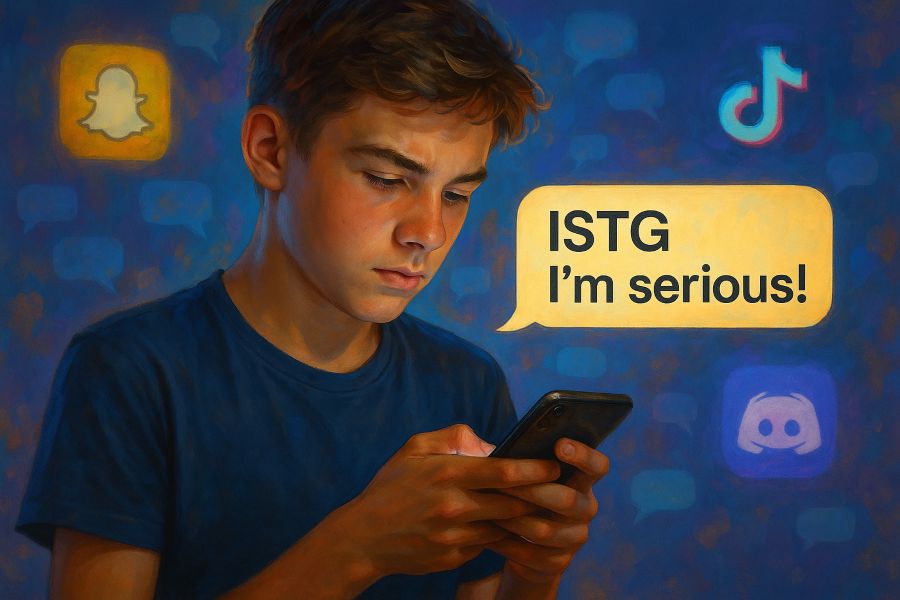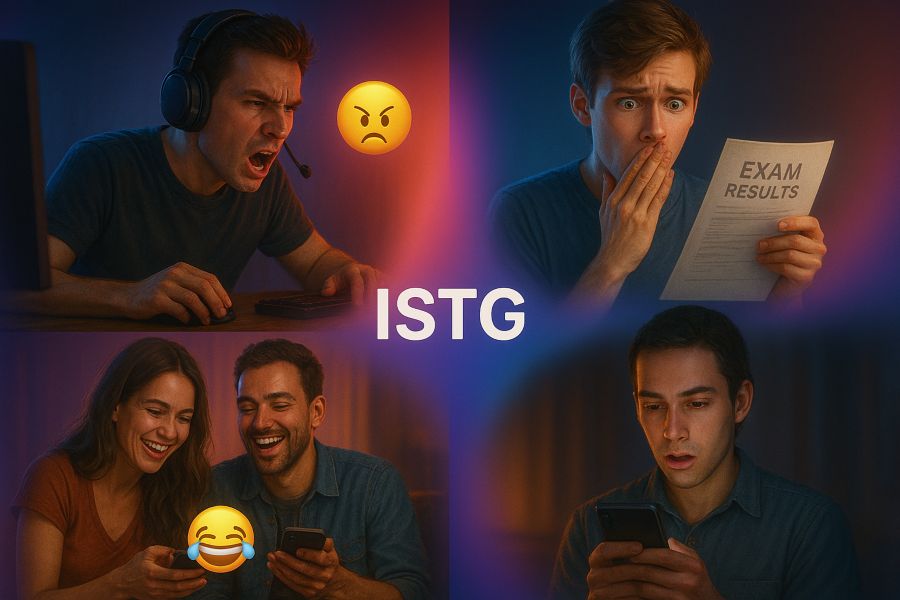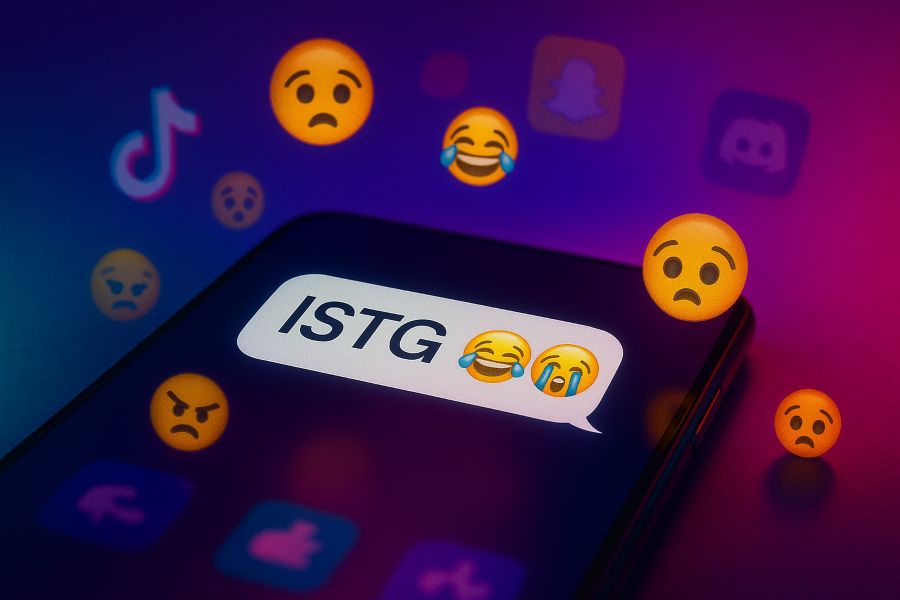Digital conversations today are filled with abbreviations that carry layers of meaning. Some, like LOL or OMG, have become so mainstream that even non-digital natives use them. Others, like ISTG, remain rooted in the online and texting culture of younger generations.
If you’ve seen ISTG appear in Snapchat captions, TikTok comments, or Discord chats, you may be wondering what it stands for and how to interpret it correctly. The acronym itself is simple—it means “I Swear To God.” But its emotional range, tone, and cultural uses make it much more versatile than just a literal promise.
Understanding ISTG requires not just knowing the definition but also grasping the different ways it’s used—seriously, playfully, or dramatically. To decode ISTG effectively, let’s explore its meaning, variations, platform-specific uses, cultural impact, and practical guidance for readers of all ages.
The Core Meaning of ISTG

Before exploring the emotional and cultural aspects of ISTG, it’s essential to begin with its direct definition. ISTG is shorthand for “I swear to God.” It’s used in conversations to stress honesty, seriousness, or strong feelings about something. While the phrase has existed for centuries in spoken language, the abbreviation came into prominence during the early days of texting and internet chats.
Why do people abbreviate “I swear to God”
Typing out whole phrases takes time, and in the world of SM, S, where every character once mattered, abbreviations like ISTG saved space. Just as LOL replaced “laugh out loud” and BRB replaced “be right back,” ISTG took hold among teens and spread rapidly across messaging platforms.
Where you’ll see ISTG most often
ISTG is especially common among Gen Z and millennials, who dominate fast-moving platforms like Snapchat, TikTok, Instagram, and Discord. On these platforms, quick acronyms aren’t just about saving time—they’re about fitting in with the cultural rhythm of online conversations.
The Emotional Range of ISTG

ISTG isn’t just one-dimensional. Its meaning changes with tone, context, and delivery. That’s why someone new to the acronym can misinterpret it if they don’t consider the mood of the conversation and examine the primary emotional tones ISTG conveys.
1. Frustration or Annoyance
One of the most common uses is to express irritation. People use ISTG almost like raising their voice in real life.
Examples:
-
“ISTG if my Wi-Fi drops again 😤.”
-
“ISTG, you’re driving me crazy right now.”
Here, the acronym signals impatience and annoyance. It’s not always literal—it’s often just a casual way to vent frustration.
2. Disbelief or Shock
ISTG is also handy when someone can’t believe what they just saw or heard.
Examples:
-
“ISTG, this exam was impossible.”
-
“ISTG did that really just happen??”
This version feels like saying, “No way!” but with more emphasis.
3. Playful or Dramatic Humor
ISTG is often used jokingly among friends to amplify humor. In this context, it’s exaggerated for comedic effect.
Examples:
-
“ISTG you’re the funniest person alive 😂.”
-
“ISTG if I don’t get pizza soon, I’ll faint.”
This is lighthearted and closer to slang, such as “FR” (for real) or “deadass.”
4. Literal Honesty or Promise
Occasionally, ISTG is used more seriously and traditionally, closer to its original meaning.
Examples:
-
“ISTG I didn’t tell anyone your secret.”
-
“ISTG I’ll pay you back tomorrow.”
This is when the acronym is used almost literally, as a way to emphasize truthfulness.
Real Chat Examples of ISTG
Examples help make these tones more straightforward:
-
Playful:
Friend 1: “That video of your dog cracked me up.”
Friend 2: “ISTG he thinks he’s human 😂.” -
Frustrated:
Gamer: “ISTG this lag is ruining the match 😡.” -
Sincere:
Person A: “Promise you didn’t tell anyone?”
Person B: “ISTG, I didn’t.” -
Exaggerated humor:
Caption: “ISTG, this filter makes me look like Shrek 😭.”
How ISTG Appears Across Platforms
The platform on which ISTG appears can influence how it’s perceived.
Snapchat
Quick captions and private chats make ISTG common here. It usually expresses daily frustrations or casual jokes. Example: “ISTG I need coffee rn.”
TikTok
TikTok has turned ISTG into part of meme culture. People use it in comments and captions, often paired with emojis to exaggerate humor: “ISTG this trend never gets old 😂😭.”
Discord
On gaming servers, ISTG appears in rants or venting about lag, bugs, or gameplay. Example: “ISTG if I die one more time because of this glitch…”
ISTG often appears in DMs and meme captions. For example, “ISTG my cat runs this house.”
Across platforms, lowercase ‘istg’ feels casual and relaxed, while uppercase ‘ISTG’ conveys a stronger emotion, such as shouting.
Variations in Style
Like many acronyms, ISTG has variations that adjust tone.
-
Lowercase (istg): Feels laid-back, often used playfully.
-
Uppercase (ISTG): Stronger emotion, signals yelling or frustration.
-
With emojis: Adds clarity—”ISTG 😭” suggests drama/humor, “ISTG 😤” suggests anger.
-
Standalone: Sometimes ISTG is used alone as a complete reaction, e.g., “ISTG.”
These nuances help readers interpret the meaning correctly without relying only on context.
Tone Decoder Table
| Tone | Example | Interpretation |
|---|---|---|
| Joking | “istg this cat is too dramatic 😂” | Lighthearted exaggeration |
| Frustrated | “ISTG if you don’t stop right now 😤” | Serious annoyance |
| Shocked | “ISTG did that just happen??” | Expressing disbelief |
| Sincere | “ISTG I’ll be there on time tomorrow.” | Honest promise or reassurance |
This simple illustration shows why tone and content are crucial when reading ISTG.
Similar Acronyms to ISTG
To understand ISTG better, it helps to compare it with other internet slang.
-
FR (For Real): Similar emphasis but softer in tone.
-
OMG (Oh My God): Shares shock but not about truthfulness.
-
SMH (Shaking My Head): Expresses disapproval, not emphasis.
-
Deadass: A New York slang term similar to ISTG in serious contexts.
These often overlap, but ISTG carries extra weight because of its ties to promises and swearing.
Why Context Matters
Because ISTG can range from funny to severe, misinterpreting it is easy if you ignore the context. For example:
-
“istg ur hilarious” → Playful compliment.
-
“ISTG stop touching my stuff” → Genuine annoyance.
Tone, capitalization, and emojis all signal intent. ESL learners and parents, in particular, need to engage with ISTG within the broader conversation.
A Timeline of ISTG in Digital Culture
-
Pre-Internet Era: “I swear to God” used in everyday speech.
-
2000s Texting: Abbreviation ISTG gains traction due to SMS limits.
-
2010s Social Media: ISTG spreads on Tumblr, Twitter, and Instagram.
-
2020s TikTok Era: Becomes a staple of Gen Z slang, frequently paired with emojis and memes.
This evolution shows ISTG’s adaptability across generations and platforms.
Parents’ Mini Guide to ISTG
For parents, seeing ISTG in texts may be confusing. Here’s what it usually means:
-
It’s rarely literal—it’s mainly used for emphasis.
-
Not consistently negative—sometimes it’s playful or funny.
-
Pay attention to tone: lowercase tends to be casual, uppercase tends to be serious or frustrated.
So if your child texts “ISTG this cat is killing me 😂,” it’s harmless exaggeration. If they text “ISTG stop,” it’s an annoyance.
ISTG in Meme and Pop Culture
Memes have amplified ISTG’s popularity. TikTok captions like “ISTG this sound is everywhere” or memes exaggerating reactions with ISTG demonstrate how it has become part of the internet’s shared language. Pairing ISTG with crying or laughing emojis has become a shorthand for over-the-top humor.
Even outside memes, it’s now a regular part of group chat culture, often used to add drama or energy to conversations.
Final Thoughts
So, what does ISTG mean in text? At its simplest, it means “I Swear To God.” However, the acronym has evolved into a versatile expression with multiple tones, ranging from frustration and disbelief to humor and sincerity. Context—whether it’s a TikTok caption, a Discord rant, or a Snapchat DM—decides how ISTG should be interpreted.
Its rise from early texting shorthand to a staple of Gen Z slang shows how online language adapts and thrives. Whether you’re a teen typing it, a parent trying to decode it, or an ESL learner exploring digital English, knowing ISTG makes conversations easier to follow.
Ultimately, ISTG reflects what makes internet slang powerful: it condenses emotion, tone, and culture into just four letters, giving digital conversations more life and personality.


